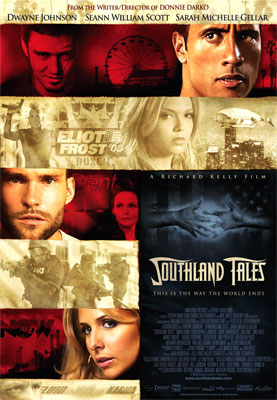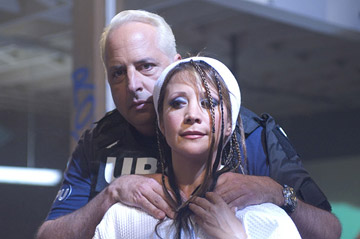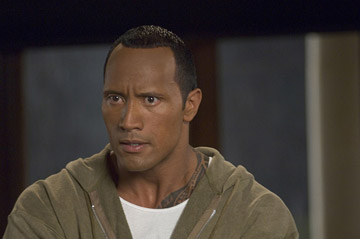 Whenever Richard Kelly’s had anything to say about his long-anticipated sophomore feature, Southland Tales, I’ve been there to ask questions. The only difference with this final interview (i.e. unless I get roped into some DVD publicity) is that now I’ve a finished film to go with the questions.
Whenever Richard Kelly’s had anything to say about his long-anticipated sophomore feature, Southland Tales, I’ve been there to ask questions. The only difference with this final interview (i.e. unless I get roped into some DVD publicity) is that now I’ve a finished film to go with the questions.
And when you finally see Southland Tales (which opens in limited release on November 14, 2007) for yourself, you’ll have lots of questions, too.
A pre-apocalyptic, pop-cultural melange featuring an amnesiac movie star (Dwayne Johnson), a twinned Los Angeles cop (Seann William Scott), an image-savvy porn star (Sarah Michelle Gellar) and character actors from all of your favorite 1980s movies, Kelly’s follow-up to Donnie Darko requires a good deal of patience and attention, and, even then, it may confound more than inspire. Perhaps this is due to Kelly essentially jumping into the middle of his narrative (there’s a three-part graphic novel prequel available for purchase right now); or maybe Kelly just likes the idea of keeping his audience scratching/punching their head.
Whatever his goal, there’s no denying Southland Tales. One just wonders if there’ll ever be any understanding it.
And sometimes, I wonder if that goes double for the ever-affable director.
Q: It has been a long journey. It’s time to close the book on me interviewing you for this movie.
Richard Kelly: Yeah!
Q: One of the things that came to mind as I was processing the movie after the closing credits – and, to be honest, I’m still processing it (Kelly laughs) – was Jean-Luc Godard stating that each of his films is meant to be seen three times. Would you place that kind of stipulation on Southland Tales?
Kelly: Yeah. I’m still discovering things about it that even I didn’t know was there. There’s so much going on, and it’s such an elaborate puzzle; it really floods your senses the first time. The second time, particularly in the first chapter, all the things that happen to set the story in motion… you start to realize why they’re there, and why they’re necessary. I hope it all becomes more cohesive on multiple viewings.
Q: Was there a particular moment in the editing where you began to feel yourself getting your arms around the material? Where you began to understand it?
Kelly: It was getting the graphic novels finished. I couldn’t get a handle on nailing the cut until I finished the books. I had a cloud in my mind. The prequel was unfinished, so I couldn’t properly finish the film until the books were done. It just took a lot of time.
Q: I have to give my colleague Devin credit for this. As we were walking out of the film, he noted that one of Seann William Scott’s identities was shot in the eye. Then I started to think back on the movie, and realized, "Hey, there are some obvious echoes of Donnie Darko in here!"
Kelly: Yeah, a little bit. Sean [McKittrick, Kelly’s producer] and I came up with that idea. He came up with the idea of one of the twins getting shot. And that’s a pivotal moment in the film because if the twins don’t find each other, then we won’t be saved. Our salvation is within these two characters, and we almost lose it. When you see the film a second time, you start to notice how precarious and delicate it all is; we’re this close to salvation, and we almost screw it up about a dozen times. The Neo-Marxists have the messiah held hostage, and they almost let him go. They really don’t understand what they’re dealing with. There’s a lot of subtext in there.
Q: But those references… are those just superficial references to Darko, or do they mean something more? Are these universes connected.
Kelly: I don’t know. I think maybe each film exists in its different dimension, but there seems to be a spiritual connection in a way. For example, Holmes Osorne is watching the presidential debate in Darko, and then he becomes the vice presidential candidate. They’re all sort of dreams that are interconnected, I guess. I like to think of each film as being in an alternate universe, so people can become different actors. It’s all running around in my head somewhere. (Laughs)
 Q: Our generation is so locked into the popular culture. We consume it, and it becomes a part of who we are and, in some cases, how we view the universe. This film is a complete pop cultural fantasia. And the flood of stimuli comes not only from what is referenced in the narrative but also the various character actors you use, many of whom were in significant 1980s movies or TV shows. What exactly were you trying to evoke here?
Q: Our generation is so locked into the popular culture. We consume it, and it becomes a part of who we are and, in some cases, how we view the universe. This film is a complete pop cultural fantasia. And the flood of stimuli comes not only from what is referenced in the narrative but also the various character actors you use, many of whom were in significant 1980s movies or TV shows. What exactly were you trying to evoke here?
Kelly: It is pop art. And it is this black comedy about the darkest subject matter you could possibly imagine. Nuclear bombs, global warming, rioting… all the madness in the film, I wanted it to be populated with the most charismatic, fun people that you’d want to invite over to your house for a party. Like the cast of Saturday Night Live: who wouldn’t want to have a party with them? They’re the funnest people ever. The Rock, Seann William Scott, Sarah Michelle Gellar and Justin Timberlake… who wouldn’t want to invite them over to a party? I wanted the film to have that quality: a fun, energetic, shiny, Los Angeles veneer – while everything is falling down and collapsing. It’s falling apart, but, man, it’s a fun time. That’s the whole point.
Q: My favorite pairing in the movie was Amy Poehler and Wood Harris.
Kelly: They’re hilarious.
Q: It was intriguing because Amy is a UCB/SNL sketch comedy veteran, while Wood Harris… I usually associate him with The Wire.
Kelly: Wood is very talented. And their marital dispute; they improvised the whole thing, and I almost fell out of my director’s chair. Amy’s just a fun, outgoing person on set; but then we put that heavy prosthetic makeup on her, and she was so freaked out by it. She got out of the Teamsters van, and she was like Greta Garbo with her sunglasses and umbrella: "Leave me alone!" And then when I yelled action, she just unleashed with that tirade.
Q: And Wood Harris is great doing his third-rate George Jefferson.
Kelly: (Laughing) They came up with that. I think they were really angry with me because I had them in that prosthetic makeup, and they had to stay in it all day. It is not fun to be wearing that stuff. I think Amy was disturbed by what she looked like. She looked so different. Their facial features were so exaggerated. I felt bad for Amy. She had to lie down and play dead for that scene. So I had to go over, hold her hand and say, "Amy, I’ll make this up to you. I promise the next time we work together there will be no prosthetic makeup."
Q: You have a habit of dropping Simpsons references into your movies, too. Like in the screenplay for Domino: I remember you telling me that Mena Suvari had a line that was a nod to Reverend Lovejoy’s classifying "In-A-Gadda-Da-Vida as "Rock and/or Roll". In this film, you have a character named Starla, which instantly brings to mind the tramp Milhouse’s father was dating after the marriage broke up.
Kelly: Oh, that’s right.
Q: You pepper these references throughout.
Kelly: There’s a Ralph Wiggum in Southland Tales, too. On Martin Kefauver’s Humvee dashboard, there’s a little Ralph Wiggum doll. I actually called Matt Groening, and he personally gave me permission. He made the call to Fox.
Q: I guess it’s appropriate. You’re attempting these kinds of pop culturally infused satires, and The Simpsons is definitely the apotheosis of how we do satire nowadays.
Kelly: Yeah. It’s just… the subject matter is so dark, I wanted to make it as accessible to mainstream America as possible, and that started with the actors that I chose to be involved in this. I tried to cast it in the least pretentious way possible, and, to me, comedians are the least pretentious… I mean, when you think of pretension, you think of someone without a sense of humor. So I wanted to get funny, funny people in there.
Q: To give it a self-deprecating air?
Kelly: Yes.
Q: As the world’s going to shit.
Kelly: Yes.
Q: And even though we should be concerned about this…
Kelly: Yeah.
Q: It’s interesting that this is the way our generation is processing the sorry state of the world right now. On one hand, we’re very upset about it. But on the other, the only way we can really cope with it is to view it from a cynical, satirical distance. Could you see yourself being able to address the misery of what it is we’ve done to this world without smirking?
Kelly: Yeah. My thing is that comedy is the best medicine when you’re talking about politics and religion. You can really infuriate people. I mean, I’m sure this film will infuriate people, but if you can use comedy as your delivery mechanism, it keeps the conversation civil. And that’s the problem right now: the right and the left are not civil with each other. This [2008] election is going to be nastier than ever, and it’s sad.
Q: There’s very little honest discourse anymore. It’s all inflamed. And most of the people dominating and directing the discourse… half the time I don’t think they believe what they’re saying.
Kelly: And it’s working. The fear-mongering and the pushing of buttons… there’s a lot of hate being thrown around unfortunately.
Q: I know you wanted to make Kurt Vonnegut’s Cat’s Cradle a while back. Is Southland Tales a sublimation of that, as yet, unrealized dream?
Kelly: Maybe. Vonnegut’s a huge influence. I think of the concept of Ice-Nine that he came up with [in Cat’s Cradle]. I guess Fluid Karma is something kind of similar. I mean, it’s completely different from Ice-Nine, but it is a big, high-concept technology involving an environmental cataclysm in an attempt to generate a new fuel concept. You could argue that Fluid Karma has a thematic link to Ice-Nine, which was the coolest thing ever that Vonnegut came up with.
 Q: You also work Philip K. Dick into this as well, which gets you into more serious, self-destructive areas. How do you reconcile these two writers’ styles?
Q: You also work Philip K. Dick into this as well, which gets you into more serious, self-destructive areas. How do you reconcile these two writers’ styles?
Kelly: Well, there’s also Raymond Chandler in there, too. They all felt like they were of Los Angeles in a way. A lot of Philip K. Dick’s stuff took place in either Los Angeles or Orange County. Vonnegut was a world traveller, and he was a legend in the sense that he fought in the war and saw atrocities and struggled with depression. And you think of Chandler, and just film noir… Ralph Meeker playing Mike Hammer in Kiss Me Deadly. Dwayne kind of studied Kiss Me Deadly. Those were all influences. Sometimes I joke that this movie is the sequel to Kiss Me Deadly. And that the spirit of Ralph Meeker has invaded Dwayne Johnson and made him schizophrenic. (Laughs)
Q: Harry Knowles noted that the celebrity-packed design of the film calls to mind movies like the ’67 Casino Royale and Candy. Were those films an inspiration to you?
Kelly: I’ve got to take another look at Casino Royale, but, no. Kiss Me Deadly was really big. The Big Lebowski… I worship that film; I think it’s the greatest thing the Coen Brothers have ever done. I saw it on cable again the other night, and it’s even better than when it came out. If I, for the rest of my year, had to make comedies about eccentric Los Angeles people, I would. I’d be happy. I love L.A. I love the madness and eccentricity of underworld Los Angeles. There’s nothing you can’t find in this city.
Q: Speaking of the energy of Los Angeles, is The Box going to have any of that energy?
Kelly: No. It takes place in Richmond, Virginia in 1976, and we’re shooting down at NASA in Langley, Virginia. We’re shooting in Virginia for the last week, and we’re recreating Richmond on interior stages in certain Boston locations; we’re faking Boston for some of it.
Q: You felt like you needed a break from Los Angeles?
Kelly: Yeah. And it’s inherent to the story. It’s whatever serves each story. And I’ll always hope to be able to shoot at least a portion of a film in wherever it’s supposed to take place.
Q: The Box would seem to offer the opposite challenge from Southland Tales; I’ve only seen Richard Matheson’s story dramatized once, and it was on the 1980s revival of The Twilight Zone.
Kelly: It’s been a ton of work trying to get the rewrite done before the strike, but it’s also been a challenge to fulfill what I think is the destiny of that short story. It was meant for something bigger. It’s a great short story, and I’m excited to be able to try to [Kelly’s iPhone vibrated the rest of the answer into the interference abyss].
Q: So back to L.A. with the next one?
Kelly: Who knows? I’m figuring it out right now. Maybe. I love this town, I really do. I can’t get enough of it.
Southland Tales opens in limited release this Wednesday, November 14th.